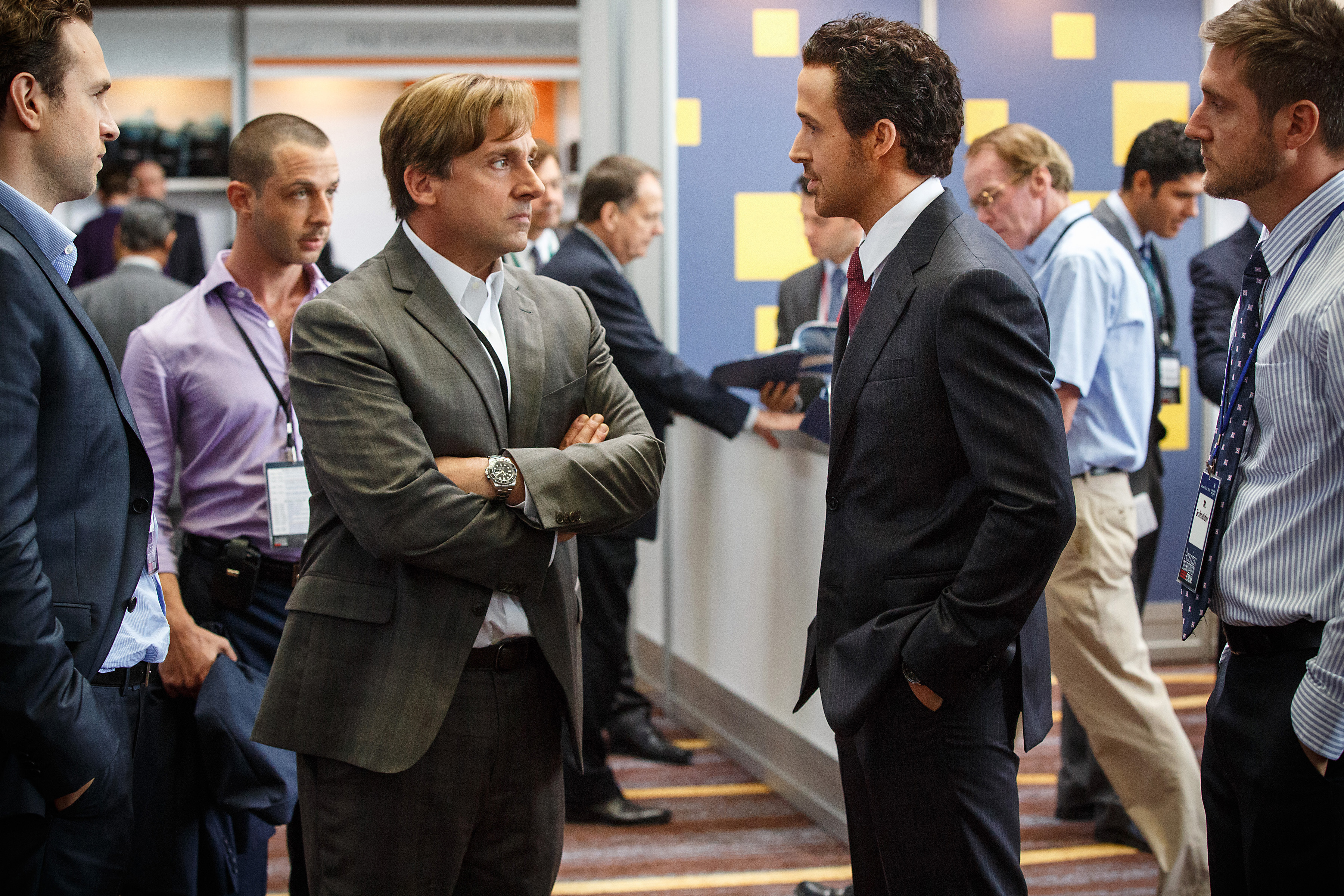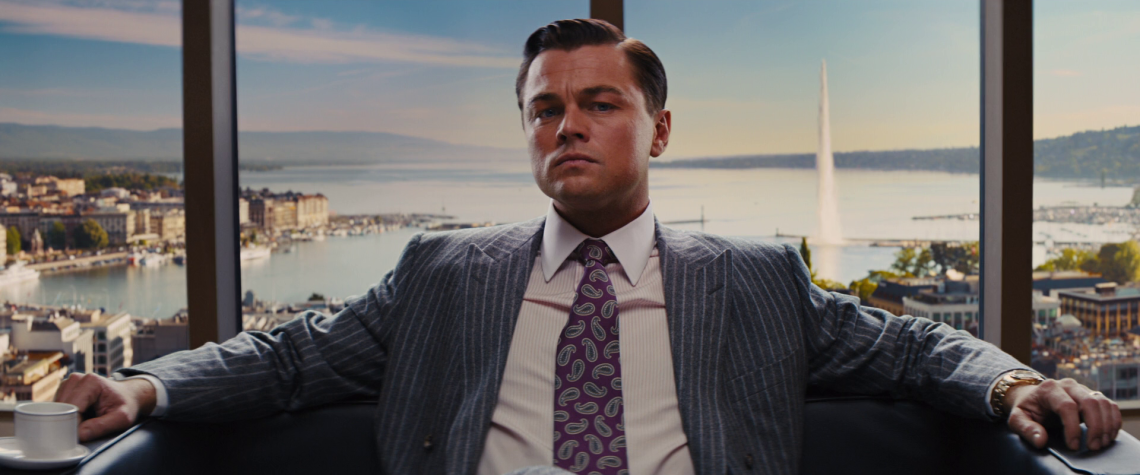If you’re roughly my age, as a high school graduate of the class of 2008, you remember that year as a watershed moment. Two events defined that time—Barack Obama’s hopeful presidential campaign and the housing market collapse, which went on to trigger a global economic crisis. Twentysomethings have lived most of their adult lives under the fallout of that crisis, so it’s fitting that the primary culprits are getting a fair amount of screen time these days.
Nonetheless, Wall Street misdeeds are hardly new cinematic territory—nor are their disastrous consequences. Take the infamous Black Tuesday crash of ’29, seen in pre-code films such as The Crash (1932) and Raoul Walsh’s The Roaring Twenties (1939). Frank Capra’s favorite antagonists were greedy bankers in his populist, homespun tales. Subsequent to the 1987 crash and the Reagan era, the so-called “masters of the universe” have long been depicted as slippery villains (Michael Douglas’s iconic Gordon Gekko, as well as the meddling Mortimer brothers from Trading Places) and outright sociopaths (American Psycho’s Patrick Bateman).
The trouble comes when filmmakers are less rigorously determined to coach us about capitalist evils. In the past five years, J.C. Chandor, Martin Scorsese, and now, perhaps the least likely arbiter of all, Step Brothers director Adam McKay have tried to probe the headspace of the guilty investment banker. Those films—Margin Call, The Wolf of Wall Street, and The Big Short, respectively— do little to overtly condemn their characters outright. In fact, in the latter two, the characters often break the fourth wall to address the audience with a conspiratorial buddy-buddy tone, as if to ingratiate themselves to us with a cheeky wink.
Perhaps that’s why so many have wrestled with the moral failings of these bankers’ onscreen portrayals. Of course, these are the individuals whose flagrant irresponsibility and predatory practices effectively destroyed the American economy. But the respective films weld themselves to that perspective. They provide insight into hermetically sealed corporate worlds and their skewed logic.

Those expecting righteous anti-Wall Street screeds were set up for disappointment. Much was said about the failure to indict Jordan Belfort in Martin Scorsese’s The Wolf of Wall Street, although it is set in the later part of the 20th century. With its amoral and exuberant depiction of white-collar criminality, it welcomed such criticism. David Edelstein wrote, “The Wolf of Wall Street is three hours of horrible people doing horrible things and admitting to being horrible. But you’re supposed to envy them anyway […]”
Thus, audience response and appeal are the cornerstone for most critiques. How does the public feel about Jordan Belfort and his kind? Why do we want to watch a film about these “cackling swine” as Matt Zoller Seitz aptly described them? Do we get a vicarious thrill from the hijinks? Or do we get angry and join the Occupy movement? Are the filmmakers encouraging or supporting any of these responses? The jury’s largely still out on Scorsese’s masterful, queasy odyssey through the world of penny stocks trading. And it remains divisive.
Perhaps The Big Short is also about horrible people doing horrible things, although it doesn’t explicitly deal with those responsible for the crisis. It instead chooses to focus on the few real-life “outsiders and weirdos” (as depicted in Michael Lewis’ book) who detected the flaw in the system, and successfully bet against the housing market before it toppled. And they netted themselves millions at the expense of nearly everyone else.
Nonetheless, some feel that these real-life analysts and bankers have been treated too ambivalently. The Guardian’s Peter Bradshaw commented, “I wanted a real attack.” The Big Short goes easy on their protagonists as profiteers—they see opportunism and turn their head the other way while the entire American housing market collapses. McKay’s response is a cynical shrug. But this is largely in keeping with the abrasive spirit of the film. The way in which McKay painstakingly examines the nuts and bolts of the crisis set the spectator up to come to their own conclusions.
The Big Short does borrow much from Wolf’s stylistic lexicon. McKay employs a quicksilver style that makes ample use of pithy inserts and asides—be it onscreen text, montage sequences, or fourth-wall breaking direct address. Both Wolf and Short use a plain-spoken, sardonic tone, assuming the audience’s discomfort or lack of interest in the admittedly jargon-heavy subject matter. The vitality and mordant humor keep things zipping along. But something else differentiates these films. The Big Short subtly positions itself to comment from the outside, unlike Wolf of Wall Street’s insider smooth talk.
In Wolf, Jordan Belfort brags about his own sale of worthless penny stocks to unsuspecting blue collar investors—and assumes that the audience is bored and disinterested in the technicalities. This dismissive attitude almost gets a direct response in McKay’s film. At one point, midway through explaining sub-prime mortgages and collateralized debt obligations, The Big Short’s voiceover asks us: “Does this make you feel bored or stupid? It’s supposed to.”

In other words, the banking industry and its baffling language encourage apathy and confusion. Bottom feeders like Belfort are more than happy to swoop in and contemptuously assure the everyman that it’s all under control. So The Big Short undermines Jordan’s “you don’t give a shit about this, do you?” arrogance by asking us to pay attention.
It’s also true that we don’t tend to feel that Steve Carell, Ryan Gosling, and Christian Bale’s characters are as appalling as Jordan Belfort; they’re merely opportunists. But no one doubts their complicity. The men acknowledge their own hypocrisy before obsessively continuing to plan for their big win. Complaints about supposed ‘sympathy’ or ‘heroics’ from these characters seem largely beyond the point. If spectators aren’t wily enough to figure out the moral latitudes of such behavior on their own, there’s not much hope for them.
2011’s Margin Call is also concerned with the internal strife of the 2008 financial crisis, so in many ways it’s closely allied to The Big Short in subject matter. But the film differentiates itself with its classy restraint, shying from the glamorous hedonism of its successors. J.C. Chandor, the son of an investment banker himself, operates with a measured, well-controlled style—particularly impressive for a directorial debut. His intense boardroom dialogue has the potential to be utterly dull, but this two-days-in-the-life of a fictional firm who has realized the sky is falling is anything but. It’s a film that lacks the stylistic flourish of its descendants, but has a real finesse for scumbag maneuvering. Risk analysts and CEO’s scramble and tussle like rats from a sinking ship, realizing that someone must publicly take the blame.
There is still a great prospective future in the financial meltdown genre. Filmmakers have only touched the surface in terms of grown-up storytelling on the subject, and as more years separate us from the shameful antics of 2008, more light can only be shed on the subject.

















